It doesn’t get more emotionally overwhelming than losing a loved one, and on top of all the grief, there are several important legal responsibilities and financial decisions that people must handle as promptly as possible.
From settling accounts and arranging funeral services to securing death certificates, the entire process that comes after losing a loved one can undoubtedly feel daunting—and this is especially the case while grieving.
We recently reached out to Jackson, Lytle & Lewis, a top-rated funeral home based in Springfield, Ohio, to get a more in-depth understanding of what people must do to prepare for a loved one’s afterlife care from a legal and financial perspective—and what we learned are things that every family needs to thoroughly understand.
So, check out the below sections to learn more about the financial and legal checklist that families must take after someone passes away:
Table of Contents
ToggleImmediate Steps To Take After Your Loved One Passes Away
If your loved one has just recently passed away, there are some initial steps that must be taken. These steps include the following:
- Obtaining A Legal Pronouncement Of Death
This step is often handled by nursing homes, hospice care or hospitals when your loved one dies in these types of locations. If your loved one dies at home and you expected it to occur, you’ll need to call your primary care physician or local hospice provider.
Things are a bit different when your loved one suddenly dies unexpectedly at home. In these scenarios, you’ll need to contact your local authorities to initiate a police investigation and obtain all necessary legal documentation.
- Notifying Close Friends & Family
The next step after your loved one passes away is to notify close friends and key family members.
Be sure to ask for their help in notifying other people and lean into your support network when it comes to more practical stuff like collecting personal items and caring for pets.
- Arranging The Decedent’s Body Transportation
If you haven’t yet selected a funeral home in your area, you’ll need to choose one as soon as possible in order to have your loved one’s body transported and taken care of properly.
Funeral homes can also help you when it comes to initiating legal processes and obtaining a death certificate.
Securing Key Documents
There are many different legal documents that coincide with someone passing away, and it’s often on a decedent’s loved ones to finalize and secure this type of documentation.
Some of the key documents that you’ll need to keep in mind include:
- Getting Multiple Death Certificate Copies
It’s important to request at least 10 death certificate copies, because you’ll need these documents for insurance providers, banks, the DMV, and various other government agencies.
- Organize Will, Trust & Advance Directives
It’s also important to organize and locate any of your loved one’s estate planning documents.
This includes documents like their:
- Last Will & Testament
- Power of Attorney
- Irrevocable or Revocable Trusts
- Advance directives
Estate & Legal Notifications
You’ll also need to keep estate and legal notifications in mind as you prepare for your loved one’s funeral.
This can include contacting your loved one’s estate executor, who will be overseeing asset distribution and probate procedures. You’ll also likely need to file your loved one’s Will with your local probate court.
The next step will be to notify the Social Security Administration to report your loved one’s passing.
You’ll then need to inform several institutions about your loved one’s death, including:
- Credit card issuers
- Utility and mortgage companies
- Credit unions and banks
- Retirement and investment account managers
- Insurance providers
Financial Affairs
As is easy to imagine, there are many different financial affairs that must be swiftly attended to after a loved one’s death.
Some of these financial affairs include:
- Transferring or Closing Financial Accounts
You’ll need to provide your loved one’s death certificate to many different financial institutions in order to do the following:
- Transfer joint accounts
- Close accounts
- Retitle or freeze assets
You’ll also want to avoid any fund withdrawing without proper legal authorization, which usually means waiting for executor or probate instructions.
- Reviewing Your Loved One’s Life Insurance Policy
Be sure to file a claim with your loved one’s life insurance provider. In order to do this, you’ll need the following:
- Completed claim form
- Death certificate
- Policy documentation
If no complications arise, you’ll likely see payouts within a matter of a few weeks.
- Verify Pension or Survivor Benefits
You’ll also want to contact your loved one’s employer to ask about factors like:
- Retirement benefits
- Unpaid wages
- Pensions
- Union death benefits
Don’t Forget To Support Yourself Throughout The Grieving Process
There’s no denying how handling the financial and legal side of things after losing a loved one can be truly exhausting, which is why you should consider working with an estate attorney, a financial advisor, and a grief counselor to make things easier on yourself.
Even though funeral homes can handle a lot of these burdens on your behalf, there’s still always going to be tedious responsibilities that come with officially saying goodbye to your loved one.
So, just be sure that you’re taking care of yourself and talking to friends and family members when you need someone to lean on!






